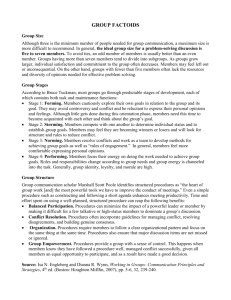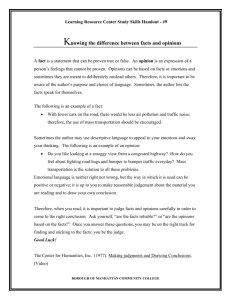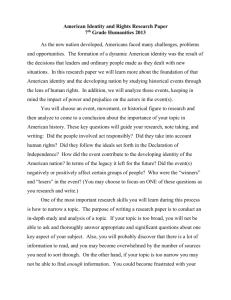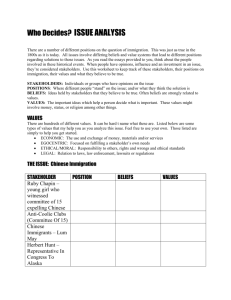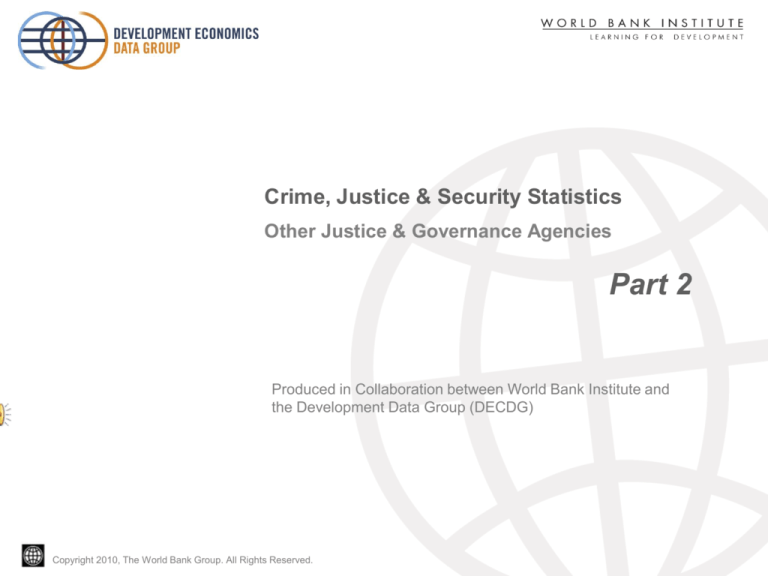
Crime, Justice & Security Statistics
Other Justice & Governance Agencies
Part 2
Produced in Collaboration between World Bank Institute and
the Development Data Group (DECDG)
Copyright 2010, The World Bank Group. All Rights Reserved.
Election agencies – general
A non-corrupt election process is a hallmark of a good system of
governance in a country. One way to measure this is through
statistics on the working of the electoral system. Aspects needing
to be measured are.
1.
2.
3.
4.
5.
The way of working of the registration process for electors
The way that candidates can register for their election
The effectiveness of the way voting is conducted
The way that results are published
The independence of the whole process
Different Statistics would be needed for each of these aspects.
2
Copyright 2010, The World Bank Group. All Rights Reserved.
Election Statistics
Aspects of system to be
monitored
Statistics needed
Working of registration process
for electors
a. Counts of registration, by constituency.
b. Opinions of ease of registration.
Working of registering process
for candidates
a.
b.
Number of candidates registered
Opinion about ease of registration
Working of the voting system
itself
a.
b.
Number of votes on the day
Opinions about voting process
Way results are published
a.
b.
Speed of publication
Cross-checks made: eg comparisons with total
registrations
Independence of the process
a.
b.
Returning officers opinions on process
Candidates/Journalists opinions on process
3
Copyright 2010, The World Bank Group. All Rights Reserved.
Registration agencies- general
Many developing countries have a registration system for all adults,
which serves as a useful basis for estimating how much demand
there will be for local services and gives a process for the
individual to prove his identity when seeking services.
Statistics from such a system are useful for different purposes:
1.
2.
3.
4.
Seeing if the registration system is working well in providing
estimates of demand.
Seeing if the system works well in establishing individual identity
Estimating future demands for the service
Cross-checking estimates made of total population numbers in
different regions of the country.
Different statistics would be needed for each purpose.
4
Copyright 2010, The World Bank Group. All Rights Reserved.
Registration Statistics
Purposes of the system
Statistics needed
Does the system provide
estimates of demand
a.
b.
Does the system establish
individual identity
Surveys of holders of identity cards as to how useful they
are in providing evidence of identity
Estimating future demands
Opinions of service providers about usefulness in
estimating future demand
Cross-checking estimates of
census figures
Opinions of CSO and other statistical agencies about
usefulness of registration data
Comparisons of local totals with census figures
Opinions of service providers as the usefulness of
registration system
5
Copyright 2010, The World Bank Group. All Rights Reserved.
Immigration Agencies
All countries have an agency to ensure that only those
welcome in the country enter at ports, airports
and other borders. The purpose of these
agencies varies: the roles that need to be
monitored are:
1.
2.
3.
To control the inflow and outflow of people
To make estimates of flow of people into and out
of the country, analysed by type: such as tourists,
businessmen or migrant workers
To reduce crime that could be committed by
migrants, either on entry (trafficking people,
goods) or after entry (illegal working, terrorism,
organised crime, drugs)
Statistics needed will vary according to these
purposes.
6
Copyright 2010, The World Bank Group. All Rights Reserved.
Immigration Statistics
Aspect to be monitored
Statistics needed
Control inflow and
outflow
a.
b.
Workload of service: number of passengers
investigated at various levels.
Numbers given different types of clearance to enter.
To make estimates of
numbers of migrants and
their expenditure
a. Counts of inflow by nationality and type
b. Counts of outflow by nationality and type
c. Amount spent while in country to estimate contribution to
national accounts
To reduce crime
Number of people stopped at the border on suspicion of being
criminal.
7
Copyright 2010, The World Bank Group. All Rights Reserved.
Publication of Statistics
• All agencies should publish regular statistics, usually as part of their
annual report, as well as on their web site, so that they can be
accessible for public discussion.
• Summary statistics should also be published by the Central
Statistical Office in their social statistics publication
• This publication should be in a popular form, with charts and graphs
included for easy reading by the media and the press.
• The publication should include simply indicators so that trends and
comparisons can be easily made.
8
Copyright 2010, The World Bank Group. All Rights Reserved.
Examples of Election statistics
There are many examples of countries that publish statistics on
areas covered in this Module: eg. Election Statistics:
1. The official electoral commission of the Philippines publishes a very
detailed web site of figures on http://www.comelec.gov.ph/
2. The South Africa electoral commission publishes very detailed
results on its web site
http://www.elections.org.za/NPEPWStaticReports/Default.aspx
3. Results from the India 2009 election are published in great detail
on the web site http://www.indianelections.com/andhrapradesh/adilabad.html
Typically all these countries publish results by each voting area, showing votes cast for
each candidate, with a good deal of material to understand better the figures
included.
9
Copyright 2010, The World Bank Group. All Rights Reserved.
Anti-Corruption Statistics
• The Kenya anti-corruption commission publishes its annual National
Corruption Perception Survey on the web site:
http://www.kacc.go.ke/docs/Surveys/National%20Corruption%20Per
ception%20Survey%202007.pdf
• The research organisation Transparency International carries out
surveys of business people to find out their own estimates of the
extent of corruption in each country. These are published annually
on their web site: a user friendly global map can be found on
http://media.transparency.org/imaps/cpi2009/
• A useful international comparison of anti-corruption activities in
South Africa including various comparative statistics has been
published by the UN on its web site:
http://www.unodc.org/pdf/southafrica/southafrica_corruption.pdf
10
Copyright 2010, The World Bank Group. All Rights Reserved.
Immigration Statistics
• A useful copy of the basic statistics form for a residence permit in
South Africa can be found on the web site at
http://www.statssa.gov.za/additional_services/questionnaires/Immigr
ation%20form_bi947.pdf
• An example of summary population data, including migration for
South Africa can be found on
http://www.migrationinformation.org/resources/southafrica.cfm
• The UK publishes good statistics about immigration and overseas
travel on the web site of the Office of National Statistics:
http://www.statistics.gov.uk/pdfdir/ott0610.pdf
11
Copyright 2010, The World Bank Group. All Rights Reserved.
Conclusion
• Many developing countries have developed new governance
agencies to deal with their own situations: these cover such aspects
as young people, law reform, anti-corruption, immigration, elections
and registration of the population.
• Each of these agencies has various jobs to do. Each job needs to be
monitored by collecting special statistics.
• Many of these statistics will involve analysis of registers kept by the
agencies: others will involve surveys of the experiences and views
of people who come into contact with the agencies.
• The Module includes examples of the statistics associated with
these different jobs and shows examples of statistics produced by
several countries.
12
Copyright 2010, The World Bank Group. All Rights Reserved.


